Is your air conditioner capacitor not working, and you're wondering if you can bypass the capacitor and how to do it? We searched for answers, and here is what we found.
The thing with air conditioner capacitors is that you shouldn't bypass them. No way exists to do it. Simply replace it with the same value as the original one if it has failed.
Keep reading as we explain why you shouldn't bypass your AC capacitors. We'll also cover the signs that your AC capacitor is faulty and what causes it.
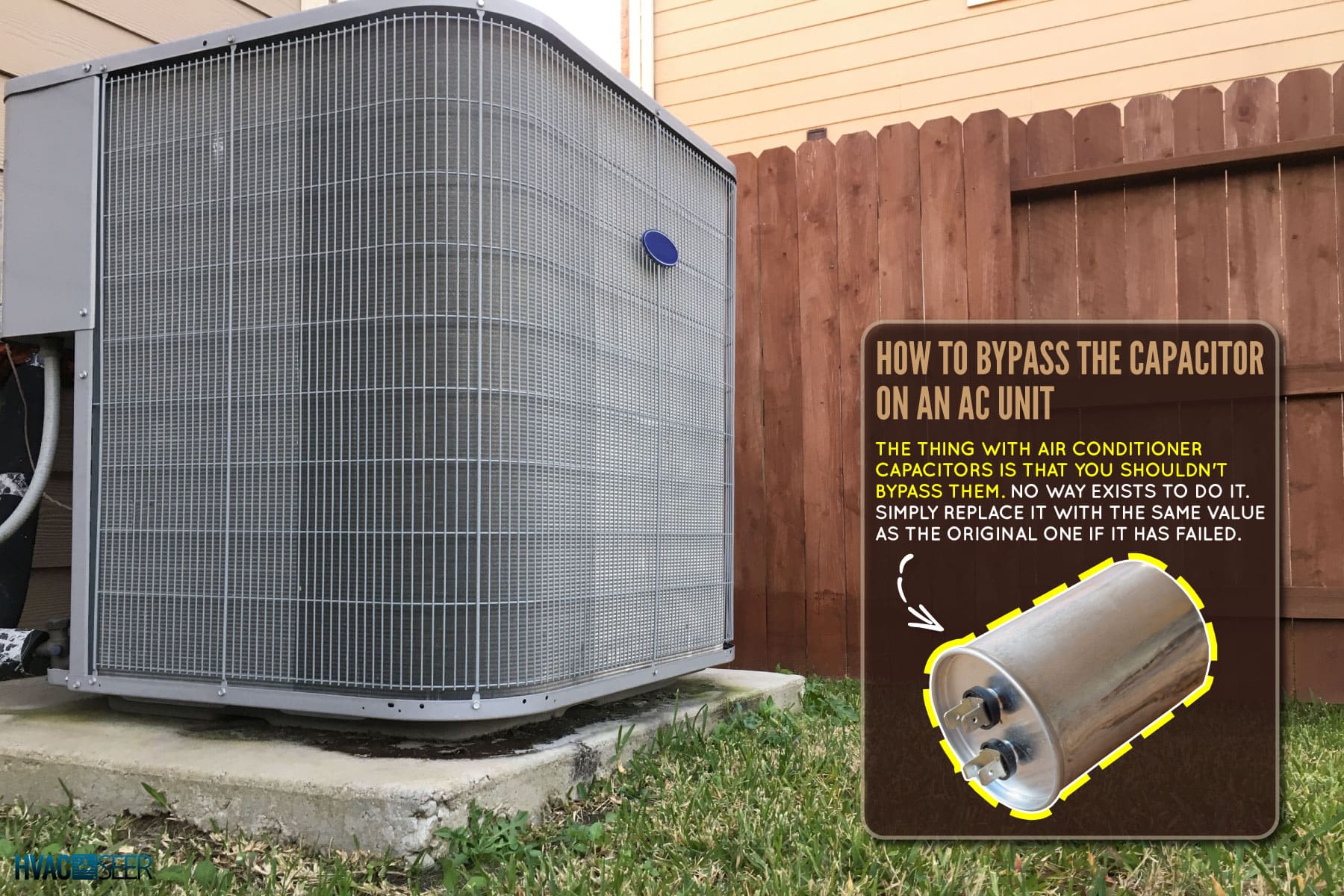
Why You Shouldn't Bypass Your AC Capacitor?
The run capacitor offers a little bit more torque for both the condenser fan motor and the evaporator blower motor, enabling the fans to run more quickly and smoothly while consuming less electricity.
Here are some of the things that might happen if you bypass the capacitor:
- Both of these motors' lifespans will be significantly shortened by bypassing the capacitor, ultimately resulting in the motors being burned out.
- Your electricity bill goes up as a result of the increased power consumption.
- Bypassing it will reduce the motor's torque, increase power consumption, make the compressor work harder to start, and may even force your compressor to spin backward, ultimately eradicating any cooling capabilities.
What Causes An Air Conditioner Capacitor To Fail?
Here are some of the causes why your AC capacitor fails:
Overheating
Capacitors are, first and foremost, susceptible to overheating. Some of the potential causes could be:
- The sun can be to blame for that overheating. This is specifically for rooftop air conditioners.
- Lightening strike.
- Overworked unit operating continually.
On those hot days, raise the thermostat a bit to prevent your HVAC system from overheating. Use reflecting shades on windows facing east and west to increase your energy efficiency.
Click here for this product on Amazon!
Power Fluctuation
A capacitor can also fail as a result of power surges. The electrical grid's variations may be the source of those less powerful surges. Even the basic turning on and off of huge equipment in your home may be affected.
Alternatively, if a summer thunderstorm results in a power outage, the surge that happens when the electricity is restored may harm the capacitors in your HVAC system.
Spare the capacitors in your air conditioner from these power surges. Think about installing a surge protector for the HVAC system.
Click here for this product on Amazon!
Old Age
A capacitor's capacity to store and release energy degrades over time, much like a rechargeable battery. Capacitors will eventually lose their effectiveness. It's relatively simple and affordable to fix as long as the failing capacitor is discovered early.
Future problems with the air conditioner could be much more catastrophic and costly if the failing capacitors are allowed to operate.
What Are The Signs That Your AC Capacitor Is Broken?
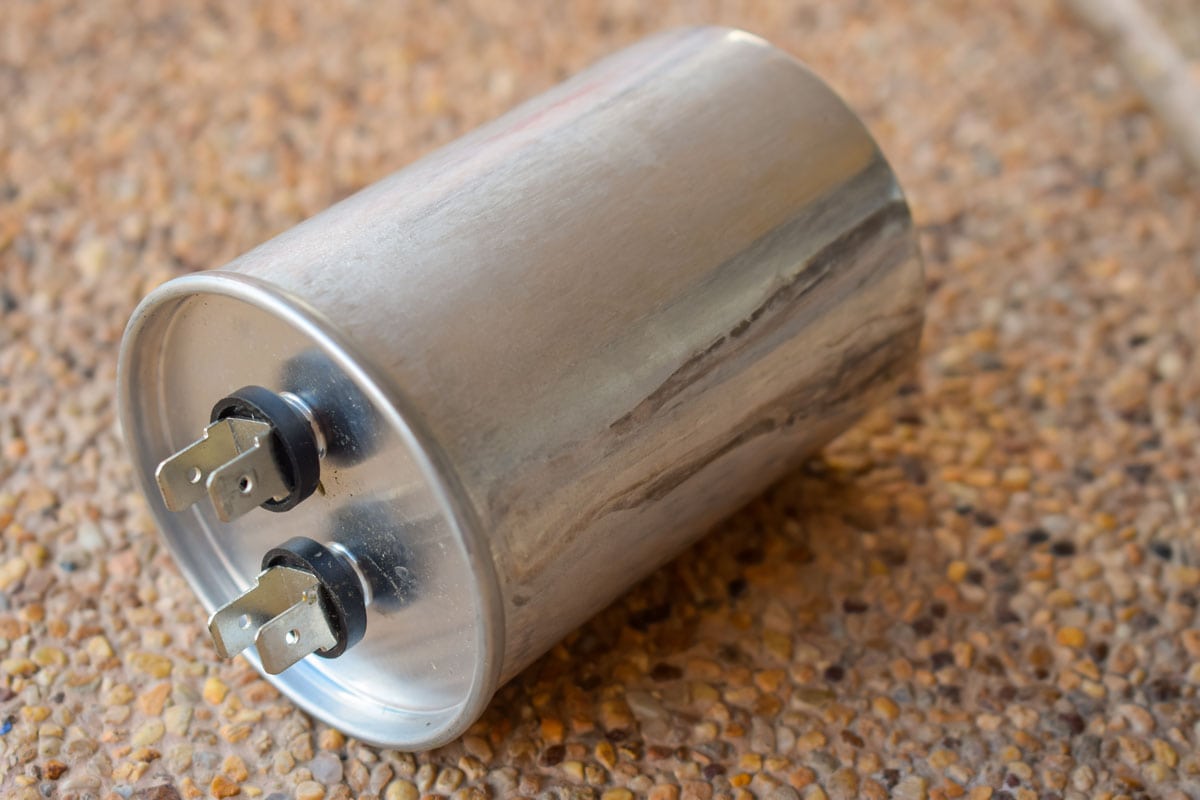
It's not always possible to detect capacitor failure before it breaks down. However, you might observe a few of these signs of a capacitor issue:
AC Emits Smoke
As the capacitor starts to fail, it can start to smoke. Because of the chemicals in the capacitor, the smoke could smell bitter.
Chemical Leaking
As the component malfunctions, the chemicals inside the capacitor may seep out.
Trouble Starting The Compressor
A faulty capacitor may be to blame if your air conditioner's compressor has difficulties starting before abruptly shutting off.
On occasion, the air conditioner would abruptly stop and restart several times.
Humming And Clicking Noise
If your HVAC system is making these noises, this could also be the result of faulty capacitors.
The Capacitor Is Swollen
The capacitor will swell up when it is seriously damaged. Although a bad capacitor frequently swells, your capacitor may still be bad even if it isn't.
It would appear as though too much material was crammed within the tube, causing it to bulge at the sides.
Low Charge Reading
All capacitors have microfarad ratings. Yours, for instance, could have a rating of 45 microfarads with a tolerance of ±10. A voltmeter will inform your HVAC expert that it needs to be replaced if it falls below the allowable tolerance.
Is It Safe To Handle A Capacitor By Yourself?
Learning about the capacitor issues with your AC is beneficial because it can assist you to identify the issue's cause. That does not, however, imply that you should ever try to replace the capacitor on your own.
Here is why:
- HVAC capacitors are capable of carrying a lot more voltage than your air conditioner does.
- Even when the power is off, these parts have a sizable amount of energy that they can use to shock someone.
- Injuries that result from improper problem management can be severe and even fatal.
It is always best to leave such tasks to experienced and well-trained professionals who have the tools and knowledge to deal with them properly.
Can You Discharge A Capacitor On Your Own?
Yes, you can! Just make sure that the tools you'll be using are well-insulated. But if you're not comfortable doing so, you can always ask an HVAC professional for help.
Why Do You Need To Discharge Your AC Capacitor?
In the event of a power outage or shortage, a capacitor will store extra electrical energy that it supplies to the main appliance or equipment. However, it is essential to discharge a capacitor before working with it to ensure safety when using a new device.
Although you might have the air conditioner's electricity turned off, these parts are built to store electrical energy. You can easily electrocute yourself without discharging the capacitors.
How Do You Safely Discharge Your AC Capacitor's Energy?
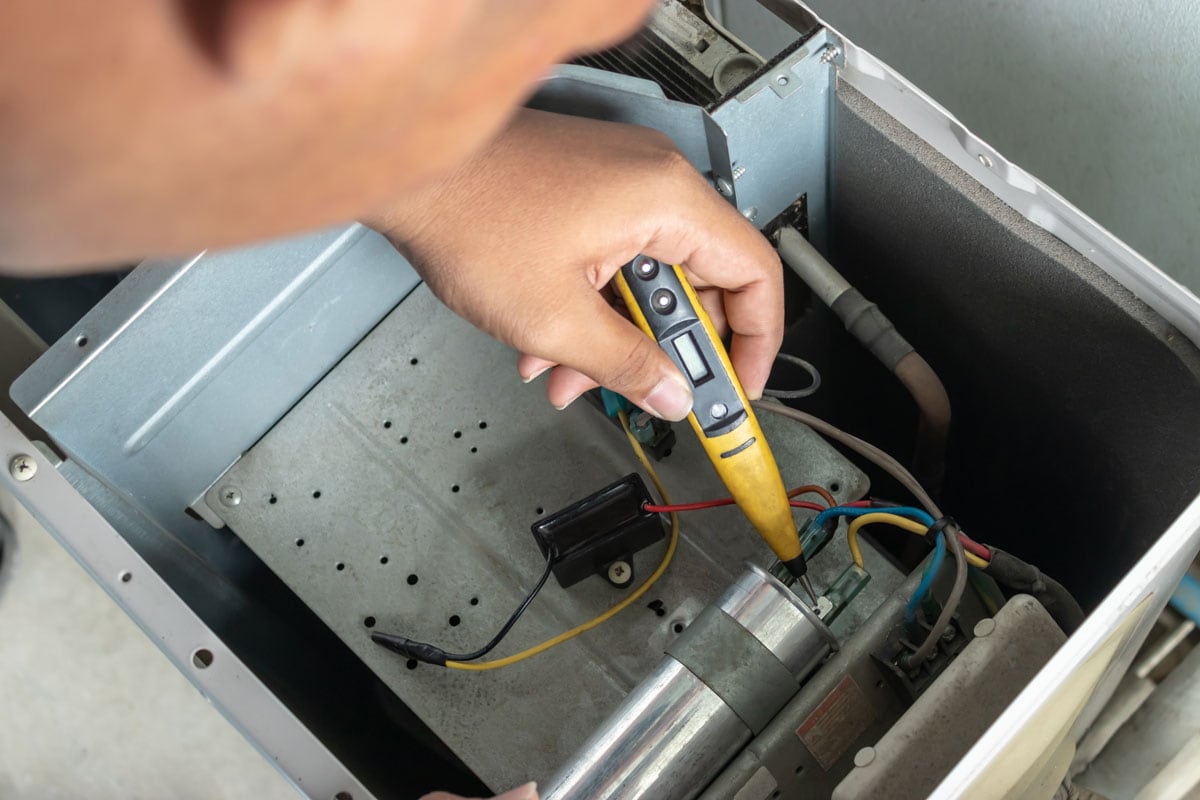
Here is a simple guide on how you can safely discharge your air conditioner capacitor's charge:
1. Cut-Off Power Supply To The Unit
At the main electrical panel, shut off the circuit breaker for the air conditioner. To avoid electrocution, check using a non-contact circuit tester that the power is off at the air conditioner.
2. Remove Side Panel
Use a screwdriver to remove the screws connecting the side panel of the air conditioner to the main assembly.
For information on a specific capacitor placement in the main assembly behind the panel, consult the air conditioner's manual. The positions of internal components are designed differently by each manufacturer.
Take off the side panel of the AC and set it aside.
3. Locate The Capacitor
Visually identify the capacitor within the air conditioner. Avoid touching anything inside the device since touching any exposed connectors or wires could result in an electric shock.
4. Discharge The Capacitor With A Screwdriver
Only use the insulated handle of the screwdriver to hold it. Never touch the tool's naked metal end.
Cross the two terminals that stick out from the capacitor with the metal end of the screwdriver. The capacitor's circuit is essentially shorted when the two terminals are connected with the metal screwdriver, releasing the stored electrical energy.
If there are other capacitors near the housing, repeat this step once more.
5. Finish Up
From within the air conditioner, take out the screwdriver. After this discharge operation, carry out the targeted air conditioner repair.
How To Measure The Capacitance Of Your Capacitor
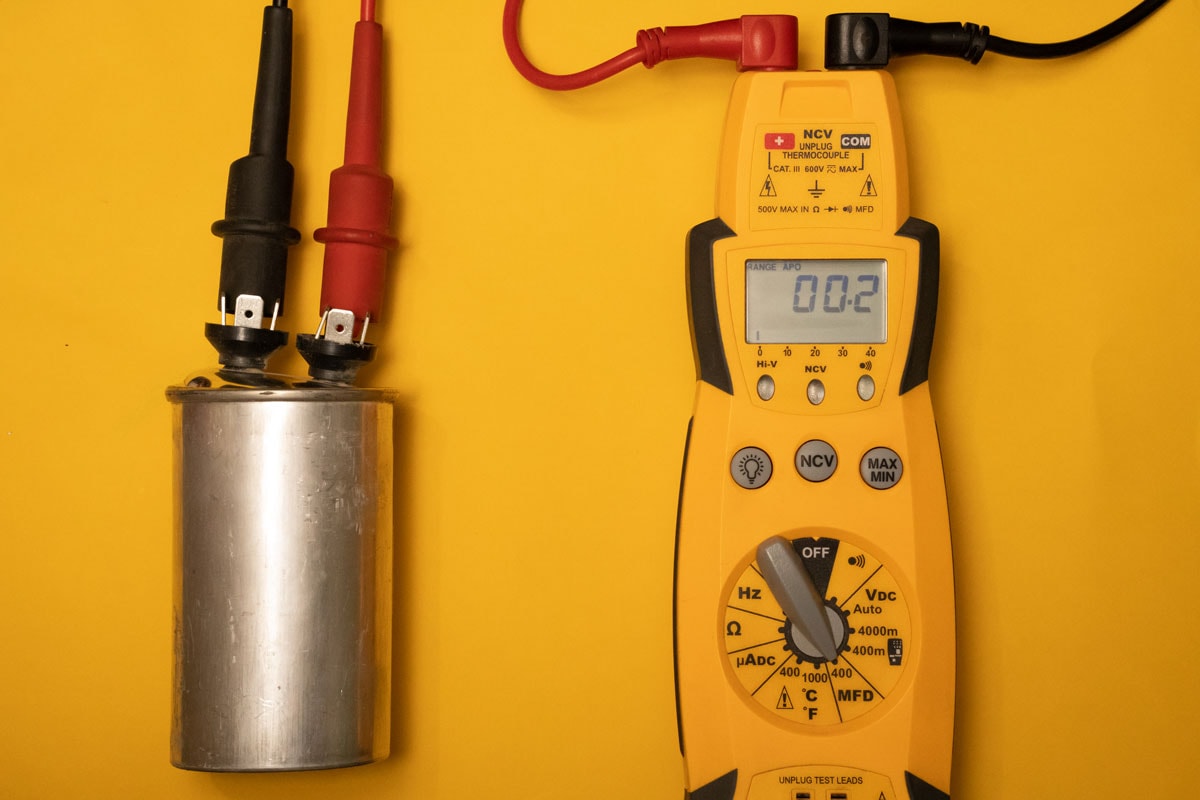
The simplest and fastest method is to use a multimeter to test a capacitor. The test requires a digital multimeter with a capacitance testing capability as the instrument.
Short the connection after removing the capacitor from the circuit to prevent electric shocks. Capacitance mode should be selected on the digital multimeter.
Then, connect the multimeter's probes to the capacitor connections. Connect the red probe to the capacitor's positive terminal and the black probe to its negative terminal for the polarized capacitor. You have two options for connecting nonpolarized.
Observe the digital multimeter's display right now to determine the capacitor's capacitance. The reading and the rating that is printed on the capacitor can be compared. The capacitor is functional if the readings are close. If there is a significant fluctuation, the capacitor can be faulty.
Click here for this product on Amazon!
In Closing
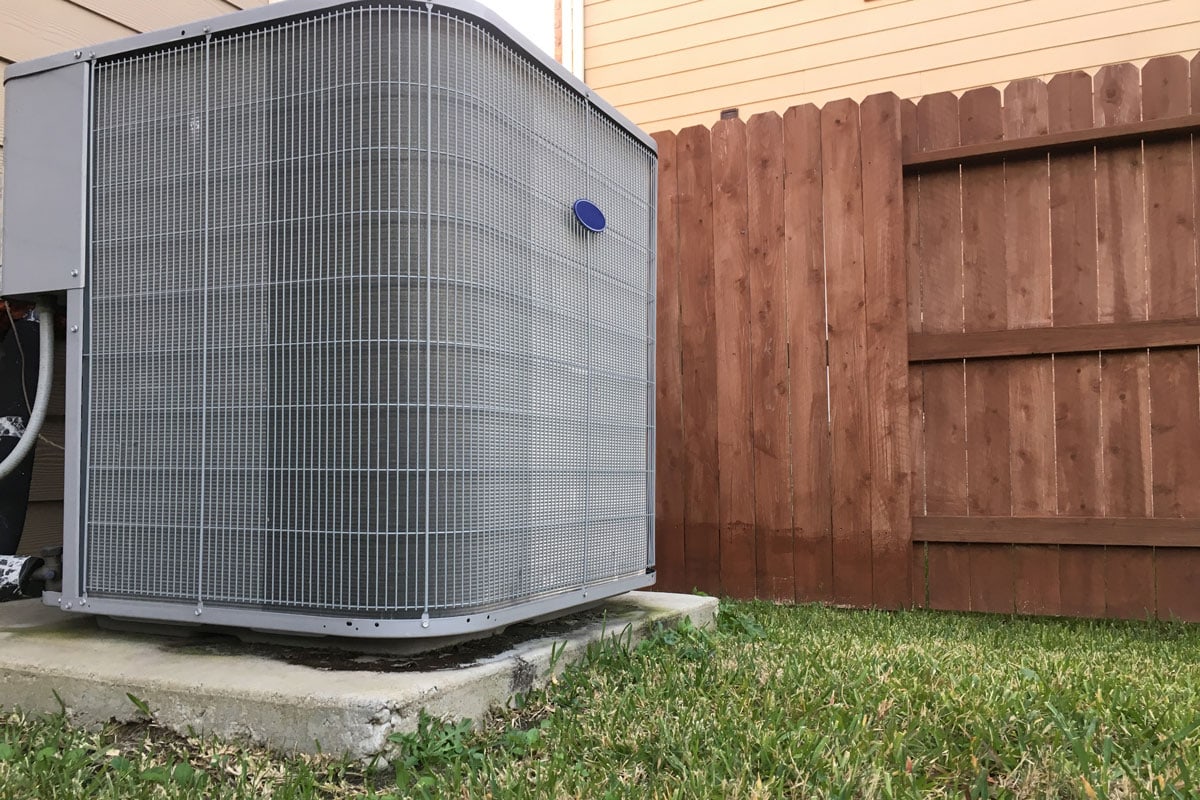
Although it may seem enticing to just bypass your AC unit's capacitor when it unexpectedly breaks down, you should never do it. It can cause more serious damage to your unit.
Call your trusted HVAC professional immediately if you observe some problems with your AC capacitor.
Before you go, you can check out these related articles:
How To Buy The Correct AC Capacitor [Things You Need To Know!]



